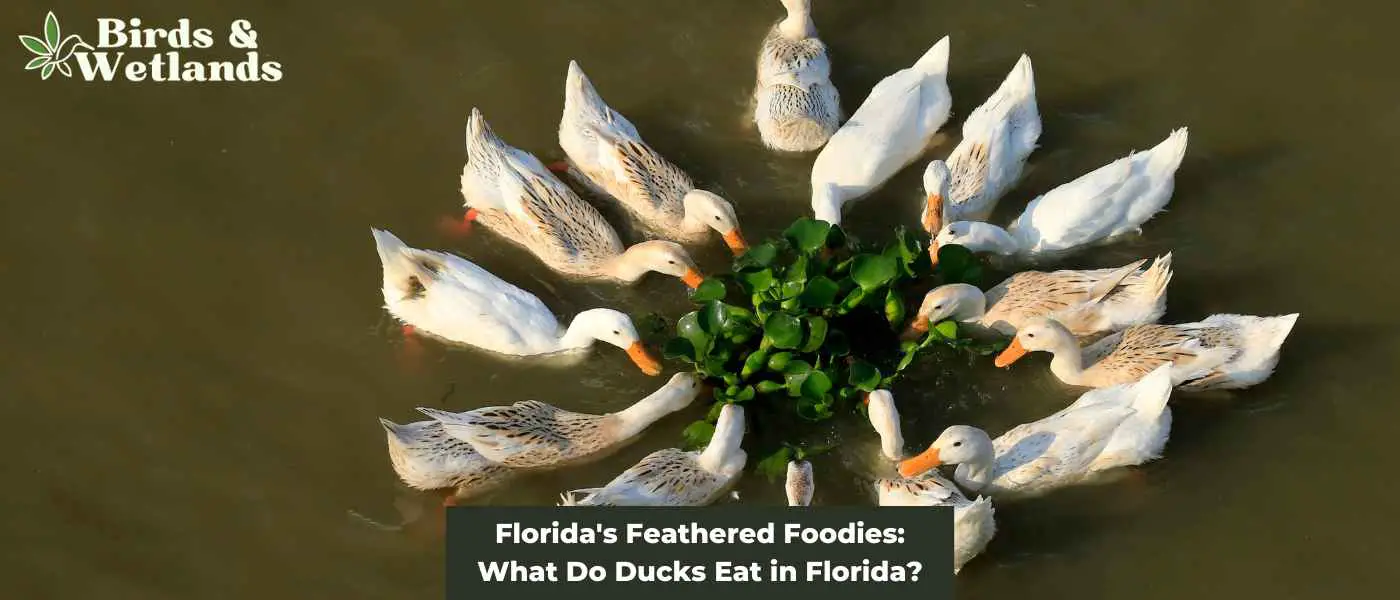Ducks are a common sight in Florida’s waterways, and many people enjoy feeding them.
But what do ducks eat in Florida?
Ducks in Florida consume a varied diet similar to ducks in other regions. They feed on aquatic vegetation, seeds, grains, insects, small fish, mollusks, and amphibians. Due to the state’s diverse habitats, including wetlands, ponds, and lakes, ducks in Florida may also have access to unique regional plants and animals, adding to the diversity of their diet.
Key Takeaways:
Ducks in Florida eat aquatic vegetation, seeds, grains, insects, small fish, mollusks, and amphibians
Florida’s diverse habitats provide unique regional food sources
Diet is similar to ducks in other regions, with some regional variations
Feeding Ducks in Florida
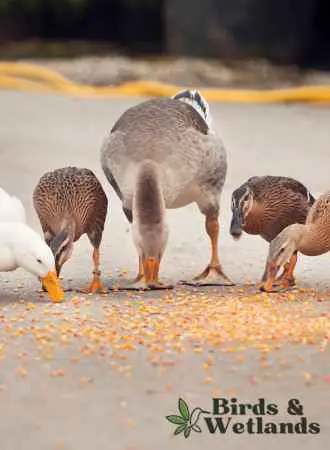
When visiting a local park or pond in Florida, it’s common to see ducks swimming around looking for food. While feeding ducks at the pond can be a fun activity, it’s important to know what to feed them and what to avoid.
If you want to feed ducks in Florida, it’s important to choose the right foods. While bread may be convenient, it’s not a nutritious choice for ducks so don’t feed ducks bread. Instead, consider feeding the wild birds a mix of seeds, grains, and chopped vegetables, such as lettuce, carrots, and peas.
You can also offer them small amounts of leftover food, such as rice or oatmeal, as long as it’s not too salty or sugary. By providing a varied diet when you feed wild ducks, you can help ensure that Florida’s ducks stay healthy and happy.
Dos
- Feed ducks cracked corn, oats, rice, or birdseed
- Provide fresh, chopped vegetables and fruits
- Offer leafy greens like lettuce, kale, or spinach
- Supply small insects, snails, and aquatic plants
- Give frozen peas as a nutritious treat
- Provide fresh water daily
- Offer calcium sources like crushed oyster shells
Don’ts
- Avoid feeding ducks bread or junk food
- Don’t offer onions, garlic, avocado, or raw potatoes
- Keep ducks away from chocolate or caffeinated products
- Refrain from giving ducks large amounts of green tomatoes
- Avoid feeding ducks unripe or overripe fruits
- Don’t leave uneaten food lying around
What to Feed Ducks
The best food for ducks is what they eat naturally, such as aquatic vegetation, small fish, and fish eggs. However, if you want to feed the ducks, there are several healthy options to consider.
One of the best options is frozen peas, which are a great source of protein and fiber and can be easily found in most grocery stores. Other healthy options include chopped lettuce, sliced grapes, and melon. Native plants and vegetable peels are also good options that can be found in the surrounding environment.
For young birds, duck feed pellets are a great option. These pellets contain all the necessary nutrients for healthy growth and can be found at most pet stores.
Best Duck Feed Pellets
Are you a duck owner looking for the perfect feed to keep your feathered friends happy and healthy? Look no further than Purina Duck Feed Pellets! With their nutritionally balanced formula and high-quality ingredients, these pellets are the ultimate solution for providing your ducks with the nutrition they need to thrive.
Pros
- Complete Nutrition: Purina Duck Feed Pellets are nutritionally balanced to provide all the essential vitamins and minerals that ducks need to stay healthy and strong.
- Easy to Digest: The pellets are specially formulated to be easy to digest, which makes them ideal for ducks of all ages.
- Promotes Growth and Development: With its balanced nutrition formula, Purina Duck Feed Pellets are designed to support healthy growth and development in ducks.
- Suitable for All Breeds: Whether you have domestic ducks or wild ducks, Purina Duck Feed Pellets are suitable for all breeds of ducks.
- Trusted Quality: Purina has been producing high-quality animal feed for over 100 years, so you can trust that your ducks are getting the best possible nutrition with Purina Duck Feed Pellets.
Cons
- Cost: Compared to other types of duck feed on the market, Purina Duck Feed Pellets can be slightly more expensive. However, many customers feel that the high-quality ingredients and balanced nutrition formula are worth the extra investment.
- Pellet Size: Some customers have noted that the pellet size of Purina Duck Feed Pellets can be quite large, which may not be suitable for smaller or younger ducks. However, many customers have reported that the pellets can easily be broken up or soaked in water to make them easier to eat.
What Not to Feed Ducks
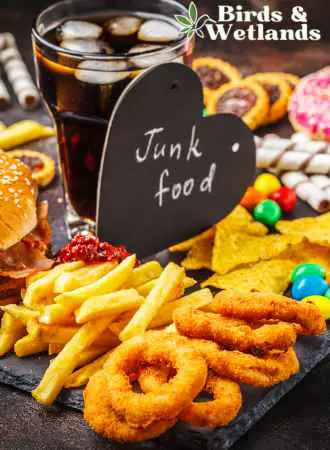
It’s important to avoid feeding ducks junk food, bread products, and other foods that have little nutritional value. Stale bread, in particular, can cause health problems such as angel wing, a deformity in the wings that can prevent ducks from flying.
Other foods to avoid include uncooked rice, citrus fruits, and any food that contains plastic clips or twist ties. Uneaten leftovers should also be avoided, as they can attract other wildlife and negatively impact water quality.
It’s also important to avoid overfeeding ducks, as too much food can cause health problems and attract larger waterfowl that can be aggressive towards smaller ducks. If you do choose to feed the ducks, make sure to only give them a small amount of food and stop feeding them once the food is gone.
What Do Wild Ducks Eat?
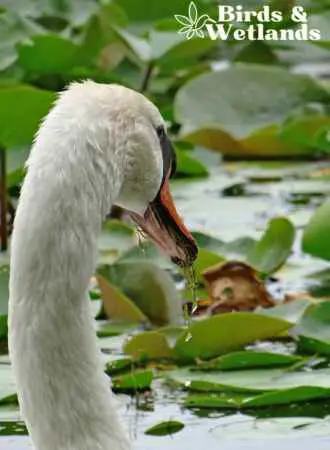
Wild ducks in Florida have a varied diet that includes both plants and animals. They are omnivorous and will eat whatever is available in their environment. Some of the common foods that wild ducks eat are:
Plants
Wild ducks like other wild birds eat a variety of aquatic plants, including seeds, fruits, and foliage, these are their natural foods.
They are known to eat most fruits, but they avoid those from the nightshade family as they can cause health problems. They also forage on grains like rice and other plants that grow in their habitats like other waterfowl.
Animals
Wild ducks eat a variety of animals, including insects, fish, and small mammals. They also eat crustaceans, mollusks, and amphibians. They will eat small pieces of bread and crackers if offered by humans, but these are not a nutritious food source for them.
Feeding
It is important to note that feeding wild ducks is not recommended as it can lead to nutritional imbalances and dependency on humans for food. If one wants to feed them at a pond or lake or in the city parks, it isthe best foods for them that is similar to their natural diet.
For example, leafy greens like kale, lettuce, and chicory are great food to feed them as they are high in nutritional content.
Also never leave food uneaten or give them junk foods. Uneaten food causes rot which can cause deadly algae blooms that affect our feathered friends and other local wildlife.
Waterfowl
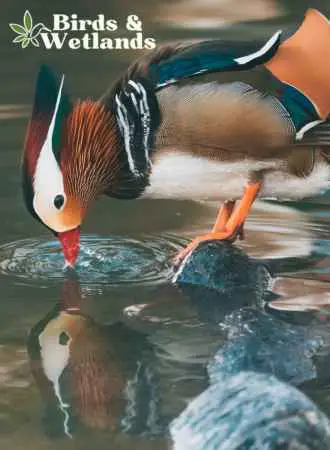
Wild ducks are part of the waterfowl family, which also includes geese and swans. They have similar dietary habits and eat a variety of plants and animals.
Wild ducks in Florida have a varied diet that includes both plants and animals. They are omnivorous and will eat whatever is available in their environment. It is important to note that feeding them is not recommended as it can lead to nutritional imbalances and dependency on humans for food.
Best Waterfowl Feed
Delightful Feeding Experience
Transform your backyard into a scenic waterfowl habitat and enjoy an interactive feeding experience with Natural Waterscapes Waterfowl Floating Food.

Pros
- Nutritious Food: Natural Waterscapes Waterfowl Floating Food is specifically designed to provide essential nutrients to waterfowl, including swans, geese, and ducks, helping them maintain a healthy diet.
- Convenient: The food comes in resealable packaging, making it easy to store and use as needed. It is also easy to handle and transport.
- Floating Formula: The floating formula of the food allows it to remain on the surface of the water, making it easier for waterfowl to eat and minimizing the risk of water contamination.
- Attracts Waterfowl: The food is formulated to attract various waterfowl species, including swans, geese, and ducks, to your pond, lake, or other water body, providing an opportunity to observe and enjoy these beautiful creatures.
- Environmentally Friendly: Natural Waterscapes Waterfowl Floating Food is made with environmentally friendly ingredients and does not contain any harmful preservatives, making it safe for both waterfowl and the environment.
Cons
- Shelf Life: The food’s shelf life may be limited compared to other types of waterfowl food due to its natural ingredients and lack of preservatives. This means you may need to use it up quickly after opening the package to prevent it from going bad.
FAQS on What do Ducks in Florida Eat
What do you feed wild Florida ducks?
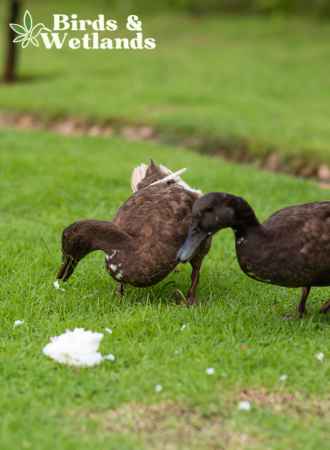
When feeding wild ducks in Florida, it is essential to provide them with a nutritious and natural diet. Suitable foods include cracked corn, oats, rice, birdseed, leafy greens like lettuce, and chopped vegetables such as peas or cucumbers. Avoid feeding ducks bread, crackers, or other processed foods, as these can lead to malnutrition and health issues.
What is ducks’ favorite food?
Ducks are omnivorous and enjoy a wide variety of foods. Some of their favorite foods include aquatic plants, seeds, insects, and small fish. When feeding ducks in a domestic setting, they may particularly enjoy cracked corn, oats, rice, birdseed, and various fruits and vegetables. It’s essential to provide a balanced and varied diet to ensure their overall health and well-being.
What food can I feed ducks?
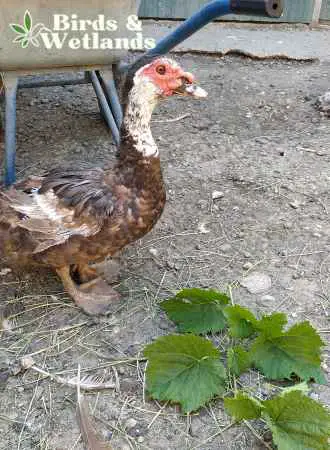
Ducks can be fed a range of healthy, natural foods that provide them with essential nutrients. Some suitable options include cracked corn, oats, rice, birdseed, chopped lettuce, sliced grapes, frozen peas, and other chopped vegetables. Always avoid feeding ducks bread, crackers, cookies, or other processed foods, as these can lead to malnutrition and health issues.
Is it okay to feed ducks in Florida?
Feeding ducks in Florida is generally acceptable as long as you provide them with appropriate, nutritious food and follow any local regulations or guidelines. It is essential to avoid feeding ducks bread, crackers, and other processed foods that lack nutritional value. Instead, offer healthier options like cracked corn, oats, rice, birdseed, leafy greens, and chopped vegetables.
Be mindful not to overfeed ducks, as this can lead to dependence on humans and disrupt their natural foraging habits. Always adhere to any local rules or guidelines about feeding ducks in public parks or other areas to ensure the well-being of both the ducks and the environment.

